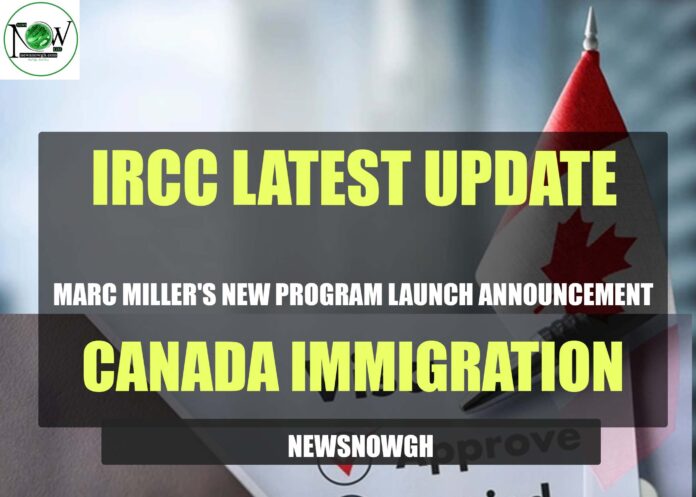Canada Immigration: Marc Miller’s New Program Launch Announcement | IRCC Latest Update
Aspiring francophone students are in for some exciting news soon. Mark Miller announced a ground-breaking program on August 14 to provide chances for pupils who speak French. This new Francophone Student Pilot is expected to establish important avenues for professional and academic advancement within the Francophone community.
Introduction
To increase the number of foreign students studying in Francophone areas across Canada, Minister of Immigration, Refugees, and Citizenship Marc Miller launched a new immigration pilot on Wednesday, August 14, 2024.
The Francophone Minority Communities Pilot Program (FMCSP), according to an IRCC press release, will increase acceptance rates and ensure that students from the Americas, the Middle East, and Africa are treated fairly in the present program.
Students and their families “will be exempted from having to demonstrate that they will leave Canada at the end of their temporary stay,” according to the IRCC, to accomplish this. Furthermore, the necessary financial threshold will be changed to correspond with 75% of the municipality’s low-income cut-off in the area where the institution’s main campus is situated.
Once their studies are finished, these students will also have access to settlement services and a straight route to become permanent residents. Beginning on August 26, 2024, 2,300 students will be admitted to the pilot program in its first year. August 2025 will see a review of this cap.
Who can Apply?
To be eligible, students must receive a letter of acceptance stating they are applying under the FMCSP from a participating Designated Learning Institution (DLI). The following requirements must be fulfilled by the study plan:
- Occupy a post-secondary position
- Have a full-time job
- After two years of study, one can obtain a degree or diploma.
- Educate students mostly in French (over 50% of the classes are in French).
Students must also be nationals of the following qualifying nations:
- Burkina Faso
- Benin
- Cabo Verde
- Burundi
- Central African Republic
- Cameroon
- Comoros
- Chad
- Democratic Republic of the Congo
- Côte d’Ivoire
- Republic of the Congo
- Dominica
- Egypt
- Djibouti
- Gabon
- Equatorial Guinea
- Guinea-Bissau
- Guinea
- Lebanon
- Haiti
- Mali
- Madagascar
- Mauritius
- Mauritania
- Niger
- Morocco
- Saint Lucia
- Rwanda
- Senegal
- Tunisia
- São Tomé and Principe
- Togo
- Seychelles
Further Details
Wives, common-law partners, or dependant children may accompany students enrolled in the FMCSP. Participants’ spouses and common-law partners might qualify for a study permit, open work permit, or visitor visa.
Notably, many of the most recent modifications to Canada’s international student program do not apply to students enrolled in the Pilot. For instance, participants are not subject to the IRCC’s processing cap for applications from international students, nor are they obliged to get a Provincial Attestation Letter (PAL) from their DLI.
The Welcoming Francophone Communities Initiative Has Added New Communities
Ten more francophone communities have joined the Welcoming Francophone Communities (WFC) initiative, according to Minister Miller’s announcement. The goal of this project is to assist some Francophone and Acadian communities in Canada with welcoming and settling newcomers who speak French.
Through this effort, IRCC and the partnering community offer settlement services to newcomers, including community building, skill development, employment support, and more. Miller announced that the following villages will now be included in the effort, in addition to the 14 currently involved:
| Province | New Communities Selected |
| British Columbia | Nanaimo |
| Manitoba | Red River (Ritchot, Salaberry, Montcalm, and St-Pierre-Jolys) |
| Nova Scotia | Chéticamp (including St. Joseph du Moine) |
| New Brunswick | Belle-Baie (including Bathurst and the Pabineau First Nation) |
| Caraquet (including Rivière du Nord and Hautes-Terres) | |
| Restigouche West Region (Saint-Quentin and Kedgwick) | |
| Saskatchewan | Prince Albert |
| Ontario | Cornwall |
| Cochrane District (Route 11 Corridor) | |
| London |
With this, there are now 24 communities taking part in the WCF overall. This program is being renewed by Canada as part of a larger Francophone immigration plan that aims to balance the use of English and French, both of which are official languages, throughout the nation, with a focus on French usage outside of Quebec. Liane Roy, President of the Federation des communautés Francophones et acadiennes du Canada (FCFA), provided additional details about them in her remarks made during today’s release:
“The WFC initiative is a powerful illustration of the dedication of Francophone and Acadian communities to the success of immigrants in general. Communities have established events to foster inclusiveness and cohabitation, and have enhanced our communities’ appeal to increase the number of Francophone immigrants.”
Canada’s Francophone Immigration Policy
The two pilot projects are a component of Canada’s immigration policy for francophones. The agency declared earlier this year that it aimed to have 6% of all new immigrants to Canada speak French.
The immigration minister must also establish “a policy on Francophone immigration to enhance the vitality of French linguistic minority communities in Canada, including by restoring and increasing their demographic weight,” according to Canada’s Official Language Act.
One action the IRCC is taking to boost the number of immigrants who identify as francophones is the launch of the new programs. Additionally, it is anticipated that the department will send out a large number of invitations to apply for Express Entry to individuals who speak French through waves of invitations based on categories.
Follow us on Newsnowgh.com to stay updated on the latest information regarding work permits, visa application processes, paths to permanent residency, and visa-sponsored employment.


